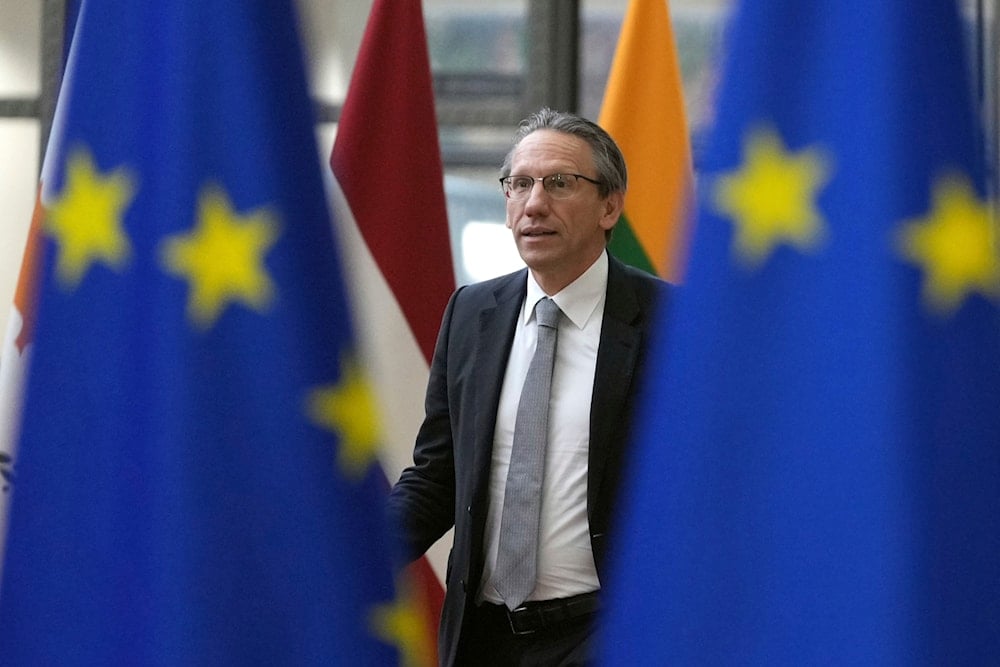Russia will not return to the G7, German finance minister says
British Foreign Minister David Lammy called on Europe to seize Russian assets instead of freezing them.
-

Germany's Finance Minister Jorg Kukies arrives for a meeting of Eurogroup finance ministers at the European Council building in Brussels, Monday, Dec. 9, 2024 (AP)
Russia will not be allowed to rejoin the Group of Seven Nations as per Trump's request, German Finance Minister Joerg Kukies told Reuters on Tuesday, emphasizing that "the condemnation of the G7 of Russia's war of aggression is very clear, especially on the third anniversary of Russia's brutal attack," while affirming that Trump's suggestion will not get the unanimity it requires.
Kukies' statement comes ahead of a G20 Finance Ministers meeting in Cape Town, a meeting that US Treasury Secretary Scott Bessent won't attend due to a "scheduling conflict". The meeting will address the current state of the global economy, among other topics.
"We really need to re-embark on a path of economic growth," Kukies said, adding that Germany "has a lot of homework to do."
The European Union is at risk of a trade war, amid Trump's promises of reciprocal tariffs on any countries that impose duties on the United States. However, Germany's finance minister assured that a trade war can be avoided since both sides are willing to negotiate, noting that "no one has an interest in starting a trade war."
The German minister highlighted that the EU surplus in goods exported to the US was almost offset by the US surplus in services exported to Europe. "If you add up both of the imbalances on the trade side, they net out to quite a reasonably small number," he pointed out.
Kukies added that the G7 could discuss longstanding proposals to use $300 billion of Russian sovereign assets frozen in Europe for the reconstruction of Ukraine, "but the discussions are just starting. It's probably a bit early to say."
Sources have told Reuters that Moscow could agree in a future peace deal to use the frozen assets for reconstruction provided that part of the money is spent in parts of Ukraine now controlled by Russian forces.
In this context, British Foreign Minister David Lammy called on Europe to seize Russian assets instead of freezing them, telling Parliament, "It's not an issue on which any government can act alone. We must act with European allies" and noting that the issue was discussed with G7 and other allies.
EU imposes sanctions on Russia
The European Union announced the approval of the 16th package of sanctions targeting Russia on February 24, adding 48 individuals and 35 organizations responsible "for actions undermining or threatening the territorial integrity, sovereignty, and independence of Ukraine," the statement read.
The sanctions included a ban on providing specialized financial messaging services to 13 regional banks considered critical to Russia's financial and banking systems, the statement read, adding that the EU introduced further restrictions on exports of goods which contribute to the enhancement of Russian industrial capabilities (chemicals, some plastics, and rubber) and their transit through Russia, as well as further restrictions on the import of primary aluminum, which generates significant revenues for Russia.
This sanctions package followed an announcement by G7 on February 15, saying, "Any new, additional sanctions after February should be linked to whether the Russian Federation enters into real, good-faith efforts to bring an enduring end to the war against Ukraine that provides Ukraine with long-term security and stability as a sovereign, independent country."
US, Russia discuss peace in Ukraine
The G7 statement followed a February 12 remark by US President Trump, who told reporters that he had a "lengthy and highly productive" phone call with Russian President Putin, discussing various topics, including the war in Ukraine, and agreed to initiate negotiations to end the conflict.
Kremlin spokesperson Dmitry Peskov confirmed the phone call between the two presidents, pointing out that the Ukraine war was a central topic.
Russian and United States delegations met on February 18 and agreed to initiate efforts to end the war in Ukraine and mend the diplomatic ties between Moscow and Washington. US Secretary of State Marco Rubio highlighted three main goals: restoring staffing at their embassies in Washington and Moscow, forming a high-level team to promote Ukraine peace negotiations, and exploring tighter contacts and economic collaboration.
Another high-level meeting between Russia and the US is set to take place within the next two weeks, according to RIA Novosti, citing Russian Deputy Foreign Minister Sergey Ryabkov who emphasized that officials will address irritants in bilateral relations.

 4 Min Read
4 Min Read











